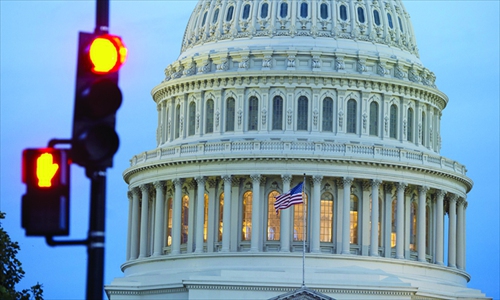US deficit is a ticking time bomb for world economy
Source:Global Times Published: 2020/4/15 20:43:40

File photo
The US' coronavirus-induced economic emergency is now almost certain to turn into a debt nightmare as reflected by the country's latest budget estimates.Due to the pandemic's blow to its economy and massive stimulus spending, the US budget deficit for fiscal year 2020 is estimated to nearly quadruple to a record $3.8 trillion, equivalent to 18.7 percent of the country's GDP, the Committee for a Responsible Federal Budget (CRFB) said on Monday. And the projected figure may still have been underestimated as the watchdog assumes the US government will not unveil any new economic stimulus package to reopen its economy during the coronavirus pandemic.
There is no denying US economic rescue efforts are necessary to avert potential catastrophe, but the US deficit is a huge ticking time bomb for the world economy. The crisis is still waiting to explode. It's easy to say there is a need to seek a fiscally sustainable solution to the huge deficit, but finding such a way out will be challenging.
In fact, even before the coronavirus crisis, the widening US fiscal deficit was already one of the biggest problems endangering the US economy. It hit $984 billion in fiscal year 2019, bringing the country's total national debt to more than $23 trillion for the first time in its history. The US spent $574.6 billion in fiscal 2019 on interest payments for the debt.
In the pre-crisis period, despite talks on how urgent it was for the US to at least rein in its debt expansion, the government showed no eagerness to figure out any sort of sustainable plan for the fiscal mess. It is now even less likely that the US will bother to address its ballooning deficits and debt any time soon.
It is foreseeable that the US' debt problem will have a huge impact on the world economy through various transmission mechanisms in the future. For starters, the soaring fiscal deficit will weaken the global status of the US dollar, leading to wild fluctuations in international commodities prices and turbulence in global financial markets. Moreover, the Fed will probably maintain its quantitative easing policy to devalue its currency, boosting exports and easing its debt burden, passing on the cost of economic adjustment to other countries.
But that may still be an optimistic scenario. In the worst-case scenario where the economy fails to recover while the deficit and debt continue to grow, the consequences of a crisis really breaking out would be unimaginable. We hope that time will never come, but there are signs it is approaching.
Posted in: GT VOICE